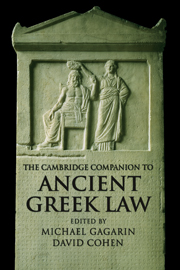
This attractive volume will be helpful to legal historians and political scientists interested in obtaining an overview of the major topics, trends, and controversies in the study of ancient Greek law. Like most volumes of its kind, the present survey features mostly well-known authorities writing on topics that have previously been the subject of their own specialized research. This, of course, represents an editorial choice with both advantages and disadvantages. The chief advantage is that such essays tend to be – and these essays certainly are – solid and trustworthy. Yet, to scholars already well-versed in Greek law, most of the essays will strike a familiar note. Such is the dilemma faced by every COMPANION editor. Should one encourage seasoned scholars to summarize prevailing wisdom, or possibly exhort contributors to offer a novel treatment? Is it possible to do both? The answer is surely yes, but only, perhaps, through unusually creative editorial design and risk-taking. One possibility is to ask well-known scholars to write on unfamiliar topics, and to lead promising younger scholars to rethink the bread-and-butter categories. On the back cover of the present collection, readers are told that this “volume is intended to introduce nonspecialists to the field as well as to stimulate new thinking among specialists.” This COMPANION does provide excellent guidance for non-specialists, but those with a substantial background will have to pick and choose carefully to find original lines of thought.
The best essays achieve the desirable balance between general presentation and original interpretation. Michael Gagarin’s “The Unity of Greek Law,” for example, begins by explaining the previous debates over the existence of a “common substratum” of Greek law. This is useful in itself. Yet Gagarin’s essay transcends the pre-existing discussion by showing that unity in Greek law should be sought not in substance, but rather in procedure. For, as Gagarin persuasively argues, procedure produced the distinctive features of archaic and classical Greek law: “It thus appears that Greek poleis largely shared the same general approach to the judicial process, with the litigants themselves pleading their case as they saw fit before the judge or judges, who were free to reach a decisions as they saw fit within the established rules (i.e., in accordance with the laws, etc.). The formalism that is well known from Roman or early English law seems never to have had a significant place in Greek legal procedure” (p.35). Greek law was public, anti-authoritarian, and contextual. Its basis was the popular discretion of entire communities. Through his careful attention to Greek political culture, and through his comparisons and contrasts with other pre-modern legal systems, Gagarin identifies common features of Greek law while also respecting the local pressures that shaped law in particular historical and geographic contexts....
Other chapters will be helpful to the non-specialist, but less so to scholars in the field. In her “Relevance in Athenian Courts,” for example, Adriaan Lanni revisits the arguments of her recent book LAW AND JUSTICE IN THE COURTS OF CLASSICAL ATHENS (on which see my forthcoming review in the AMERICAN HISTORICAL REVIEW). Lanni argues that while Athenian popular courts generally interpreted legal relevance broadly in order to reach contextual judgments, Athenians also applied strict relevance to their homicide and maritime cases. A similarly solid contribution is Michael Gagarin’s “Early Greek Law.” Drawing on his deservedly well-regarded book of the same title, Gagarin shows that archaic Greeks combined written law with oral procedures that favored rational argumentation, publicity, transparency, and flexibility, instead of “formal procedures or automatic proofs, such as oath-swearing” (p.93). This unusual combination leads Gagarin to assert, plausibly but controversially, the distinctiveness of early Greek law by comparison with other ancient legal systems.
For the rest, click here.